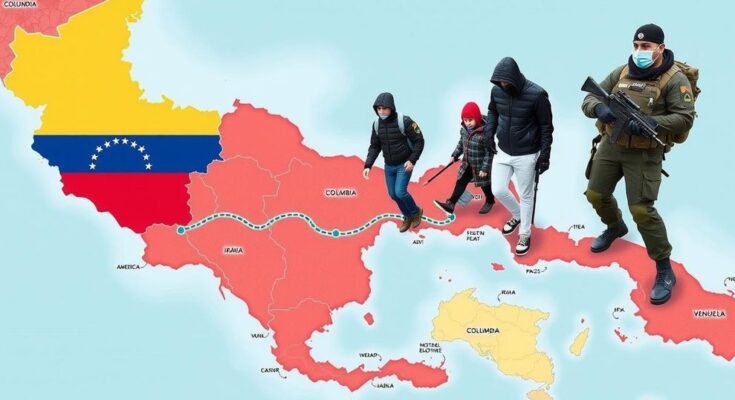Recent reports indicate a rise in Iranian nationals traveling through Colombia, raising security alarms regarding Iran’s influence in Latin America. The developments correlate with Venezuelan President Nicolás Maduro’s re-election events, emphasizing enhanced bilateral relations and military cooperation. Reports suggest that coordinated efforts leverage counterfeit documents for migration while Hezbollah’s presence compounds regional risks. Both nations engage in economic exchanges to circumvent sanctions, complicating international security dynamics.
In recent weeks, significant numbers of Iranian nationals, purportedly linked to Venezuela, have been detected in Colombia, alarming Latin American security officials and Western diplomats regarding Tehran’s growing influence in the region. This phenomenon coincides with Venezuelan President Nicolás Maduro’s controversial re-election celebrations, where he publicly acknowledged the Islamic Republic of Iran, signifying deepening ties between the two nations. Iran’s support for Maduro has intensified following the re-exchange of Alex Saab, a businessman closely aligned with the Maduro regime, who now serves as Venezuela’s Minister of Industry.
Colombian authorities have reported organized attempts by Iranian citizens to transit through their nation utilizing counterfeit Greek documentation, highlighting suspicions of state involvement. Incidents at major Colombian airports revealed sophisticated forgeries, indicating a possibly coordinated effort to exploit international air links. Furthermore, the bilateral relationship between Iran and Venezuela extends into military cooperation, establishing a joint drone development program, raising concerns among Western security officials about the potential implications of a strengthened Iranian presence in Latin America.
Moreover, the report underscores Hezbollah’s operational footprint in Venezuela, where it has interwoven itself within the illicit economy controlled by the Maduro regime. Intelligence suggests that Venezuelan operatives receive combat training in Iran, further complicating the regional security landscape. Economically, the fragile alliance is bolstered by direct flights facilitating a gold-for-oil exchange, circumventing international sanctions. Overall, heightened collaboration across defense, technology, and energy sectors cements the Venezuela-Iran partnership as part of a transnational network that poses significant challenges for stability in Latin America, particularly amidst growing global geopolitical tensions.
The emergence of Iranian nationals in Colombia amidst allegations of strategic collaboration between Iran and Venezuela poses significant regional security concerns. Iran’s increasing ties with the Maduro administration, marked by public endorsements and military partnerships, reveal a potential alignment that extends beyond conventional diplomacy. As Venezuela faces isolation due to international sanctions, the Maduro regime seeks alternative alliances that could have profound implications on regional stability, particularly involving militant groups such as Hezbollah and state actors like Iran. This evolving dynamic warrants close scrutiny from Western security officials and Latin American policymakers.
In conclusion, the Iranian influx into Colombia and the deepening ties between Iran and Venezuela signal a worrying trend for regional security. The sophisticated nature of Iranian documentation for travel, in conjunction with the military and economic cooperation evidenced by recent agreements and operational collaborations, suggests a calculated strategy between the two nations. As these developments unfold, they present substantial challenges for stability and international relations in Latin America, especially in the context of increasing competition from global powers such as Russia and China.
Original Source: www.intellinews.com




